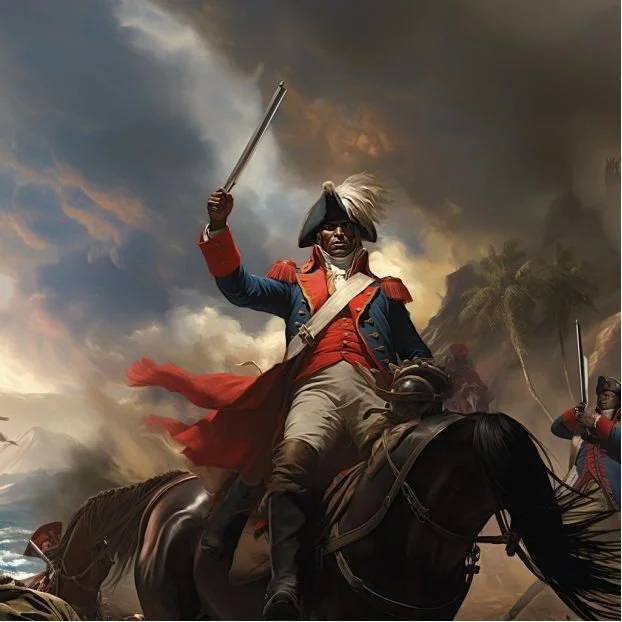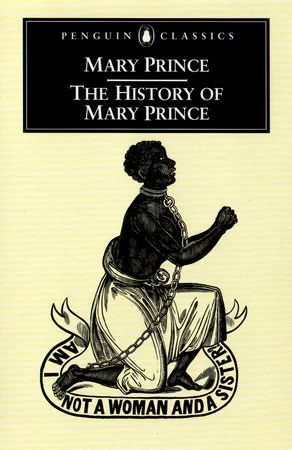Remembering Our Past, Building Our Future: How the Exchange of Ideas Fueled Abolition—and How Black Levers is Continuing that Legacy
Today is the International Day for the Remembrance of the Slave Trade and Its Abolition and an opportune moment to reflect on the global exchange of stories and ideas that powered the abolitionist movement. The fight against slavery was never confined to one region—it was a global struggle, with abolitionists communicating and inspiring each other across borders. Through newspapers, pamphlets, conventions, and letters, these activists built a network that spanned continents, uniting people in a shared mission for justice.
The Global Impact of the Haitian Revolution
Depiction of Toussaint Louverture leading the Haitian Revolution
The Haitian Revolution, led by people like Toussaint Louverture and Jean-Jacques Dessalines, sent shockwaves across the world, proving to enslaved people everywhere that freedom was achievable. Their fight not only inspired enslaved people in the Americas but also had a profound impact on the abolitionist movements in Europe and beyond.
Voices of Abolition: Equiano, Prince, and Gama
Mary Prince's Book Cover
In Britain, Olaudah Equiano and Mary Prince used their writings to expose the atrocities of slavery, influencing public opinion and rallying support for abolition. Meanwhile, in Brazil, Luís Gama’s legal battles against slavery inspired activists across Latin America. These voices were crucial in spreading the abolitionist message and rallying global support.
The Power of Interconnected Movements
The power of these movements lay in their interconnectedness. Abolitionists understood that their struggle was global, and they used every tool at their disposal to communicate, coordinate, and inspire each other. This spirit of global solidarity didn’t end with the abolition of slavery—it continued throughout the 20th century and remains vital today.
Legacy in Modern Movements: Civil Rights to Black Lives Matter
Fast forward to the Civil Rights Movement, when Malcolm X spoke at the African Summit Conference, highlighting the global rebellion against oppression. More recently, the Arab Spring and the global response to George Floyd’s murder remind us of the importance of solidarity in our interconnected world. Black Americans and South Africans coordinated efforts to end apartheid, and today, the enduring solidarity between Black Americans and Palestinians exemplifies how global networks continue to support the fight against systemic oppression.
Black Levers: Continuing the Legacy
As Frantz Fanon put it, "Each generation must, out of relative obscurity, discover its mission, fulfill it, or betray it." Today, our mission is clear: to stand united against all forms of oppression and use our collective power to build a better world.
Just as our ancestors used communication to unite and inspire, Black Levers continues this legacy by providing a platform for Black millennial and Gen-Z voices worldwide. We are the modern-day abolitionist network, connecting people across borders, facilitating the exchange of ideas, and building a global community dedicated to resisting oppression and fighting for justice and equality.
On this International Day for the Remembrance of the Slave Trade and Its Abolition, let’s recommit to this ongoing struggle, knowing that together, we are unstoppable.
Conclusion
In remembering the past, we draw strength and inspiration for the future. The abolitionist movement’s success was rooted in global communication and solidarity—a legacy that continues today through platforms like Black Levers. On this day, we honor the sacrifices and triumphs of those who fought for freedom and commit to continuing their work in our modern world.
FAQs
What was the impact of the Haitian Revolution on the abolitionist movement?
The Haitian Revolution had a profound impact on the abolitionist movement by proving that enslaved people could successfully fight for and win their freedom. It inspired abolitionists worldwide and was a catalyst for other uprisings and the eventual abolition of slavery in many regions.
How did communication play a role in the abolitionist movement?
Communication was crucial in the abolitionist movement as it allowed activists to share ideas, strategies, and successes across borders. Through newspapers, pamphlets, letters, and conventions, abolitionists created a global network that united people in the fight against slavery.
Who were some key figures in the global abolitionist movement?
Key figures in the global abolitionist movement include Toussaint Louverture, Jean-Jacques Dessalines, Olaudah Equiano, Mary Prince, Luís Gama, and Vicente Guerrero. Each of these individuals played a significant role in advancing the cause of abolition in their respective regions.
What is the legacy of the abolitionist movement today?
The legacy of the abolitionist movement continues today in the ongoing struggle against systemic oppression. Modern movements like Black Lives Matter, the fight against apartheid, and global solidarity efforts draw inspiration from the interconnectedness and communication strategies of historical abolitionists.
How does Black Levers continue the abolitionist legacy?
Black Levers continues the abolitionist legacy by providing a platform for Black voices across the globe, facilitating communication and collaboration in the fight against oppression. It serves as a modern network, uniting people in a shared mission for justice and equality.
Why is global solidarity important in the fight against oppression?
Global solidarity is important because it amplifies the voices of those fighting against oppression, allowing for shared strategies and support across borders. This interconnectedness strengthens movements and increases the chances of achieving lasting change.


